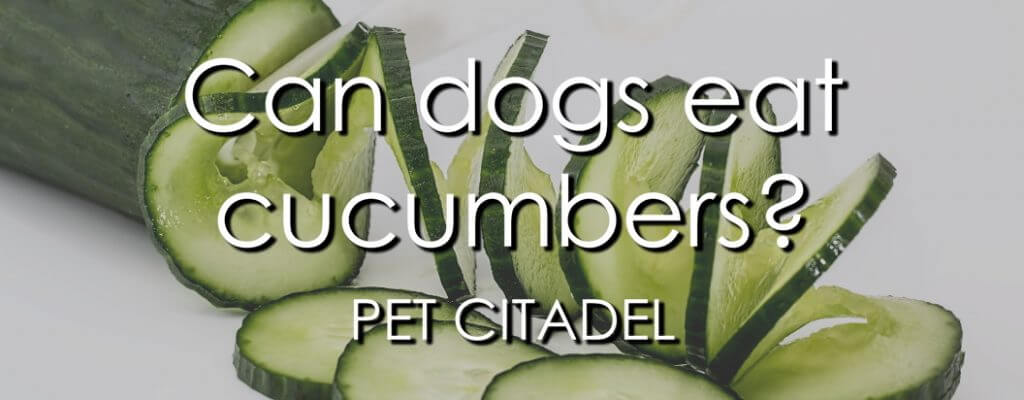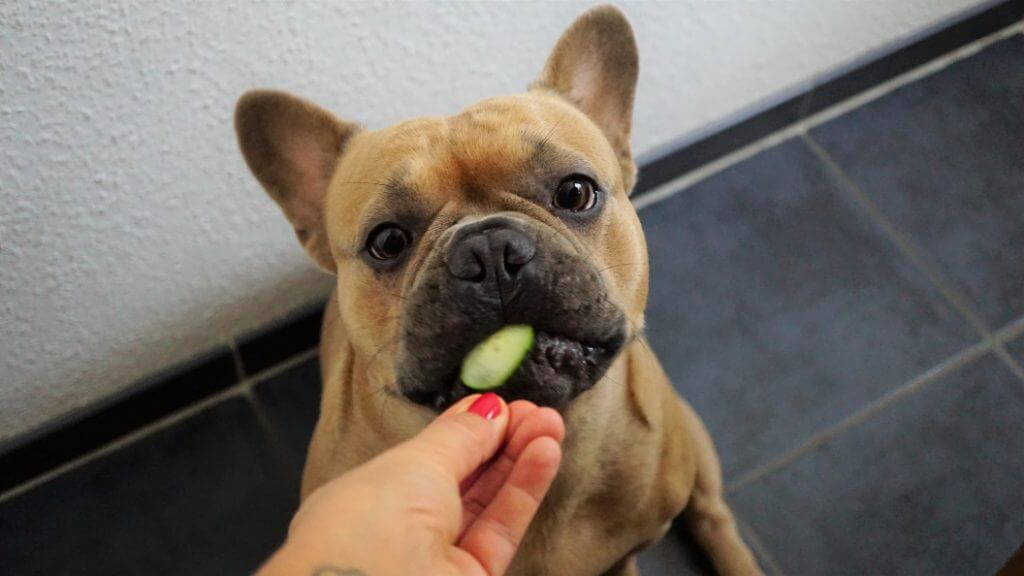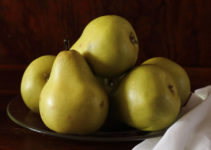This post may contain affiliate links. You can view our affiliate disclosure here.

Knowing what foods are safe for your dog can sometimes be extremely confusing. Many human foods, such as onions or avocado, are not healthy for your dog to eat, and some, such as xylitol-containing chewing gum or chocolate, can be downright deadly.
There are some people foods, however, that are very safe and even healthy for your dog to eat in moderation.
Cucumbers are great for us. They are low in calories and high in nutrients and fiber with a satisfying, juicy crunch that keeps us feeling good for a long time after.
Cucumber is a very healthy part of the human diet, but is cucumber safe for your dog?
Fortunately, cucumbers are not just puppy safe but are also quite healthy for dogs to eat.
Cucumbers make excellent treats for overweight dogs or diabetic dogs due to their low calorie content. Though there are many vegetable with higher vitamin content, cucumbers are low-calorie and very safe for your dog to eat.
What parts of the cucumber are safe?
All parts of the cucumber are safe for dogs.
The peel should be removed or washed thoroughly if the cucumber might have been treated with pesticide, but if not, the skin, flesh, and seeds are all okay to give your dog.
Your dog will appreciate the antioxidants, vitamins, and fiber that the peel has to offer.
Dehydration

Cucumbers, along with their close relatives, the melons, are high in water and can be given to your dog if they are dehydrated, not drinking as much as it should, or if the weather is hot.
Unlike melon, however, cucumber is very low in sugar and is also a diuretic which is why some vets recommend giving cucumber to dogs that refuse to drink or are having urination issues.
Now, of course, not all cucumbers are made alike. Only give your dog fresh, unseasoned cucumber.
What about pickles?

Pickles, though often made from cucumbers, are very sour, high in sodium and often heavily spiced for human consumption. This makes them quite unhealthy for your dog and can hurt their stomach.
Prolonged high-sodium diets can also damage canine kidneys and lead to kidney disease, so pickles are a definite no-go.
Additional Considerations
Even raw cucumbers can have their downsides, though. Avoid giving your dog whole cucumbers, especially if it tends to gulp its food or eat too quickly.
Whole cucumbers, along with whole carrots, can be a choking hazard. The solution to this is simple: simply cut up cucumbers before giving them to your dog.
In addition, some dogs are sensitive to high-fiber diets or specifically to cucumber. If your dog shows any symptoms of allergies, diarrhea, or upset stomach, discontinue giving it cucumbers.
Of course, if your dog exhibits any unusual symptoms or has extended bouts of diarrhea, consult with your vet, as these can be symptoms of a more serious problem.
Conclusion
Much like in people, cucumbers can be a healthy addition to a canine diet.
High in water, fiber, and antioxidants, cucumbers offer a low-calorie alternative to many fatty, starchy store-bought treats and can be helpful in addressing canine weight gain and dehydration.
We all like a refreshing salad from time to time, and now you can share these healthy foods with your dog by chopping some extra cucumber next time.
Thanks for reading. Are you considering feeding your dog cucumber? Feel free to share your situation in the comments below.



